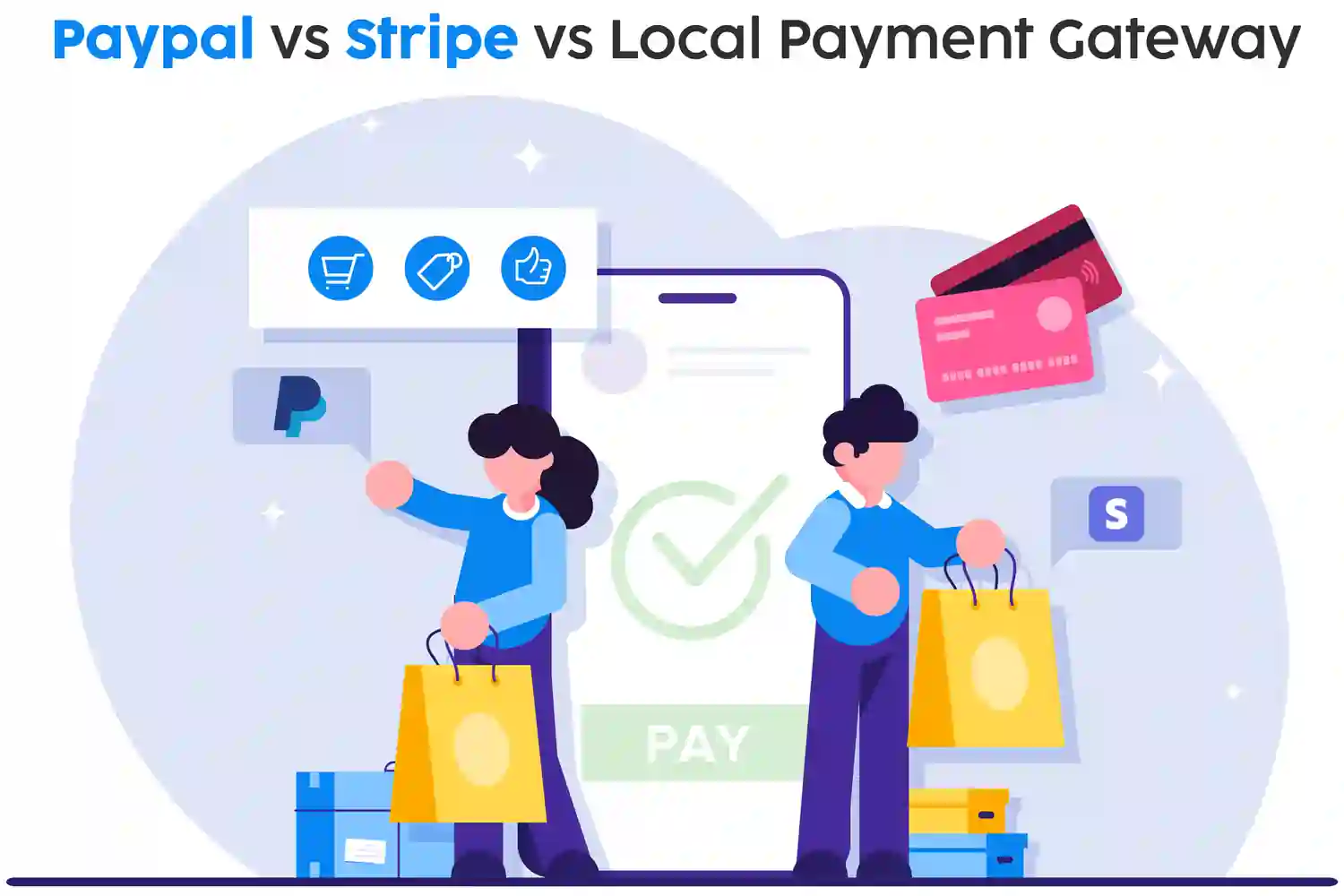
When it comes to e-commerce app development, there is never a dull moment, and selecting the appropriate payment gateway can have a defining impact on the transactions, customers, and the company. Since there are so many methods to choose from, let’s compare the three most used solutions – PayPal, Stripe, and local processors, so you can see which approach suits your business model.
That is why, in this article, we will discuss these payment gateways closer and indicate their advantages and disadvantages, and how they can affect the E-commerce App Development Services strategy.
For firms conducting their operations in e-commerce, the choice of payment gateway is crucial. Integrating an effective payment gateway implies that the transactions run smoothly, and the clients will trust you and in the long run both the business and the customers avoid scams. Irrespective of which model you belong to – whether you are a small business just starting out or are an enterprise that has developed an app and is trying to incorporate the best payment methods and avoid the worst ones, the gateway you choose actually impacts your revenues, your user satisfaction, and can even extend to your global branding.
Now, let's look at the comparison between the three main options: PayPal, Stripe, and other local payment APIs.
Boost customer engagement and loyalty with proven strategies from Digittrix experts.
Focus on your business growth while we help you keep your audience connected and engaged.
PayPal is one of the oldest and most influential/web-based payment solutions on the whole World Wide Web. It is not only a well-known and trusted payment gateway but also connected to millions of users and customers all around the world which makes it ideal for businesses that target clients from overseas.
Global Availability: It operates in more than 200 countries which makes it ideal for use when dealing with cross-border e-commerce.
Ease of Use: Overall, the steps in creating a PayPal account are easy to follow even for a person with little or no experience in designing a website. The integration with most ecommerce app development platforms is easy.
Security: It is also important to note that PayPal has firm measures when it comes to the security of any transaction newsletter for buyers and sellers and efficient anti-fraud systems.
Widespread Trust: Here the customers get a feeling of security while charging on their purchases since PayPal is respected across the globe, increasing the chances of conversion.
Flexible Payment Options: Customers can pay using their PayPal balance and using ‘Link my bank account’ using bank details or using the credit/debit card linked with PayPal.
Instant Transfers: PayPal offers a fast solution for merchants; they can pass their money to their PayPal account within a few minutes, unlike most of the other gateways which may take a few days.
Fees: Constant or even high PayPal charges constantly apply to transactions and are relatively high, especially for international transactions. To small businesses, these fees are very dear as they reduce the overall profit of the business.
Limited Customization: Mobile payment processing through PayPal is relatively inflexible in terms of customization, thereby making the user interface experience for PayPal in a mobile application less flexible than rivals such as Stripe.
Stripe is a favorite of technology-minded entrepreneurs and businesses that demand advanced levels of control over payment processing as it is armed with customization and mobile-optimized features for developers.
Customization: stripe has offered more APIs that enable developers to have complete control over the payments. Such flexibility is very important to companies that are fully committed to Ecommerce App Development Services.
Global Reach: Like PayPal, Stripe also accepts payments in different currencies and countries adding for businesses with a more extensive client base.
Recurring Payments: Stripe offers many fundamental features of subscription management that are very useful, especially for businesses that deal in recurring revenue.
Full Customization: Stripe also allows businesses to create a mobile or website payment interface with a custom feel and look-through design relative to their business brand.
Competitive Fees: The fees charged by Stripe are a tad lower than PayPal’s but much more preferable for the international market.
Comprehensive Developer Tools: Stripe continues to offer some of the best developer doc and integrations making it easy to fit into any ecommerce app dev project.
Technical Complexity: Stripe is a developer’s dream come true but teams that don’t possess internal technical support will find it equally challenging to implement and manage the gateway. This makes mobile app development a necessity if you are interested in getting the most out of Stripe.
No Native Point of Sale (POS) Solution: There is no standalone POS system available in Stripe, which can be an issue for companies with an online and offline store.
Make your Website or Mobile App smarter by adding AI tools like ChatGPT or Gemini with Digittrix's help.
Let DIGITTRIX handle the AI integration so you can focus on running your business and keeping your users happy.
Local payment gateways are payment solutions that have been specifically developed for localized use, aiming at the integration of localized banking systems, localized preferred currencies, and/ or localized legislations. Such gateways can be very useful to such businesses when they are oriented toward a specific region or niche.
Localized Experience: Local payment gateway will allow payment methods that might be prevalent at a particular geographical location like bank transfer, Mobile payment, or Cash on delivery.
Lower Fees: Quite often, local payment gateways are cheaper than international ones, such as PayPal or Stripe.
Compliance: In this aspect, local gateways were better placed to deal with regional regulatory frameworks hence, compliance.
Tailored to Local Markets: For businesses whose business models target specific countries, the local payment gateways are a more satisfactory solution. It may also aid in key performance indicators such as customer satisfaction and conversion.
Faster Settlement Times: Quite often, local gateways boast better settlement rates than popular global ones such as Stripe or PayPal which can be helpful for small businesses.
Better Currency Conversion Rates: Exchange rates are usually more suited by local gateways since they help reduce some costs when engaging in international transactions.
Limited Global Reach: The main disadvantage, however, is that such local payment gateways cannot expand their business internationally. When it comes specifically to establishing an international market, relying on a local gateway only poses limitations.
Less Support for Recurring Payments: The local gateways that businesses may wish to use might not have the robust subscription management features that Stripe provides; this is especially important in businesses that make frequent payments.
Comparing PayPal, Stripe, and local payment gateways, some criteria need to be taken into account for choosing the suitable payment solution for your business and your customers. All these gateways have their areas of spécialisation and the best to use will depend on the kind of business that is being run, the target market, and the tech know-how of the business.
PayPal: A reference for companies that have an international presence or for those that seek a straightforward and reliable service. PayPal is also suitable for companies that may not possess a technical team as it is easily implementable on most online selling programs.
Stripe: It is the best solution for companies that require complete management of the payment process and have developers on staff. Stripe is the best option if you are targeting mobile apps and you need a highly tailored payment process.
Local Payment Gateways: These fit well with businesses that are area or market-oriented. Low cost, comparatively favorable exchange rates, and faster money transfer allow using them for small businesses or start-ups oriented at a particular region.
The main theme for the present discussion is to examine and compare the characteristics of various consumer touch points and the best practices for preventing the customer’s cart from being abandoned. Given below reminds us that the selection of the payment gateway influences the customers’ experience of the e-commerce website or application: Here’s a quick breakdown:
PayPal: Of course, customers trust PayPal, and such an opportunity to make a purchase in one click will certainly help increase conversion.
Stripe: Stripe can be highly customized and used to create a uniform checkout experience that is good for your e-commerce app.
Local Payment Gateways: The user experience can vary. Some local gateways have a simple, intuitive flow when it comes to checkout; there may be ones where customers for instance will have to go through several steps and possibly abandon the cart.
The success of your business would also dictate the type of payment gateway to integrate into your e-commerce business, your target market, the volume of transactions, and the level of integration required for mobile app development. Here’s a quick recap:
PayPal: Ideal for businesses that would like a secure international payment solution provider to cater to their needs. It is highly compatible with other businesses but it is costly especially when making cross-border transactions.
Stripe: Most suitable for businesses that require many additional features and site granularity. However, it is a bit more complex in terms of implementation and management. It requires a lot of technical knowledge.
Local Payment Gateways: Especially suitable for companies operating in certain regions or those who want to minimize domestic transaction expenses. Although they may not be as secure, as international, or as equipped with later functions compared to PayPal and Stripe.
Therefore, no matter if anyone is starting up a new business or an already established one, it will be advantageous to know the pros and cons of these payment gateways to arrive at the right decision for the kind of business one is running. When choosing this gateway, choose one that will be most relevant to your business model and customer expectations, and find out how your gateway can be implemented by e-commerce app development services.
Choosing the right payment gateway is crucial for ensuring smooth transactions and a positive customer experience. When deciding between PayPal, Stripe, and local payment gateways, it’s important to understand the strengths of each option and how they align with your business needs.
If you’re unsure which payment gateway is the right fit for your business, our expert team at Digittrix can guide you through the process. With over 14 years of experience in Website and app development integrating seamless payment solutions, we’ll help you choose the gateway that best suits your business model.
For a consultation on which payment gateway to choose, schedule your appointment today by calling +91 8727000867, or reach out to us via email at digittrix@gmail.com


Written by Vandana Abrol
An enthusiastic developer and skilled business management expert with over a decade of experience in the field
Do you need help in Mobile App development ?




Join over 1500+ businesses we've already helped!
A payment gateway is a service that processes credit card payments for online businesses, ensuring secure transactions between customers and merchants.
Local payment gateways often offer lower fees, tailored support for regional payment methods, and compliance with local regulations, making them ideal for businesses focused on a specific market.
Yes, PayPal is widely recognized and trusted, providing an easy integration process and various payment methods, making it a popular choice for e-commerce businesses.
Stripe offers highly customizable solutions, strong developer support, subscription management features, and transparent pricing, making it suitable for businesses needing a tailored payment processing system.
Consider factors such as your target audience, business model, cost of transactions, customization needs, and compliance requirements to determine the best payment gateway for your ecommerce platform.

©2026Digittrix Infotech Private Limited , All rights reserved.